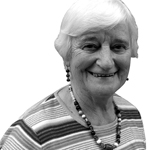On the pilgrim way: Finding welcome in Shetland - Reform Magazine
 On holiday in the Shetland Islands, we are being refreshed by immersing ourselves in a different culture, landscape and history. We have both aged in the six years since our last visit, and cannot do the long walks over rough ground we did last time. However, we have still walked on remote moorland tracks, seen a greylag goose’s chicks scurrying through the heather, and watched two hares bounding up a slope.
On holiday in the Shetland Islands, we are being refreshed by immersing ourselves in a different culture, landscape and history. We have both aged in the six years since our last visit, and cannot do the long walks over rough ground we did last time. However, we have still walked on remote moorland tracks, seen a greylag goose’s chicks scurrying through the heather, and watched two hares bounding up a slope.
Shetland̕s remarkable history of welcoming the stranger has impressed us. From an Essex perspective, the Shetlands are almost off the map; but for centuries, even for millennia, Shetland has been on the M1 of sea routes. In the 1600s, Dutch fishermen came in such numbers that there were church services in Dutch for them. They left their clogs outside the church door and naughty local boys mixed the shoes up! In the late 1800s came the herring boom, bringing 1,000 boats each season, and thousands of Irish and West of Scotland “gutter girls” to gut the fish. The effect on the small crofting communities must have been dramatic, but the girls’ postcards home tell of fun as well as hard work. Concern for their spiritual welfare led to the first Roman Catholic church being built in staunchly Protestant Shetland.
Shetland was strategically important in both world wars. It is particularly proud of the story of the Shetland Bus which operated out of Scalloway in support of the Norwegian resistance during the Second World War. Existing close relations with Norway were cemented by personal friendships, and even marriages, arising out of that dangerous venture. During the Cold War 2,000 RAF personnel were based in the far north, and they are still much missed; in a cafe in that area there is a little exhibition with photos of all the squadron leaders.
With the coming of oil in the 70s, and again today with the building of a gas pipeline, Shetland, with a population of 23,000, has once more embraced the stranger for a season. Bulgarians have recently come and settled – their decorating skills much appreciated. We met a Geordie bus driver in the remote north who moved there five years ago and feels completely accepted.
We even had our own welcome! On a track leading down to a bay, a farmer roared up to us on his quad bike. With great friendliness he told us the history of his farm and pointed out the island in the bay where his mother came from. He asked us if we were Christians and then gave his testimony to being saved by Christ from alcoholism. With a wave, he roared off – only to return to shout: “3 John 1, verse two!” (which is: “Dear friend, I pray that you may enjoy good health and that all may go well with you, just as you are progressing spiritually.”)
Sheila Maxey is book reviews editor for Reform
____
This article was published in the July/August 2014 edition of Reform.













Submit a Comment